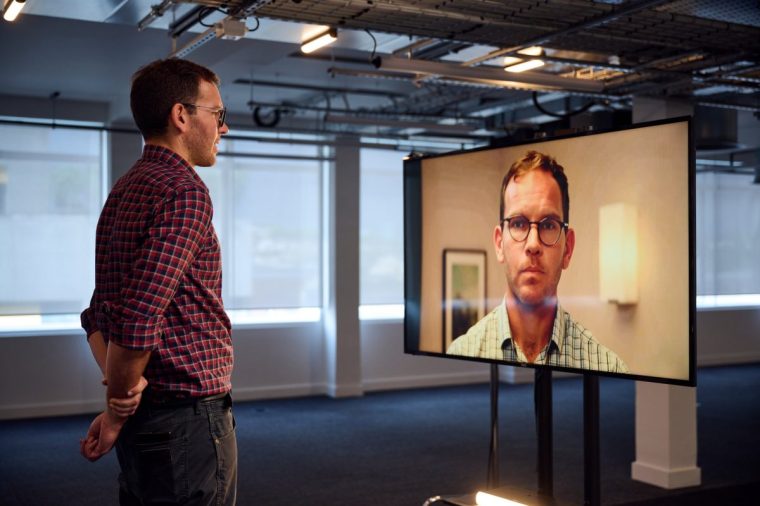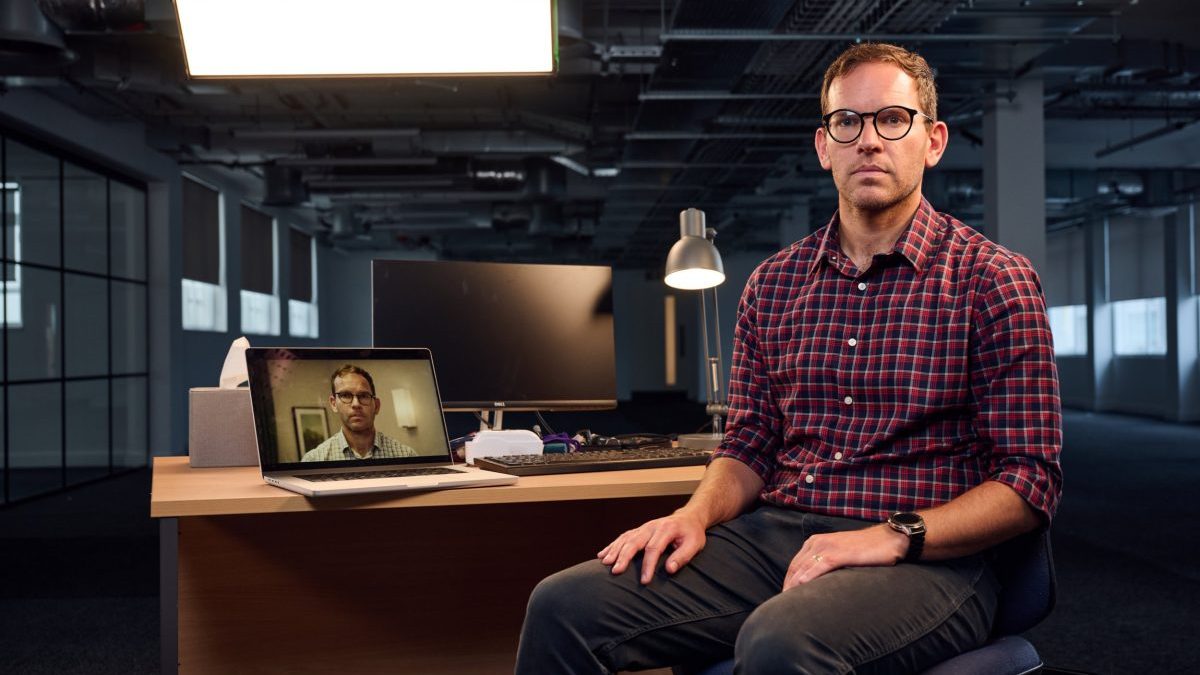In a new documentary, four British professionals were pitted against an AI ‘clone’ to find out how safe their job is
Every day, someone new warns that AI is coming for our jobs. Ford CEO Jim Farley said at a recent conference that AI could “replace literally half of all white-collar workers”. OpenAI CEO Sam Altman claims it could replace a third of all tasks in the economy over the next decade. Globally, up to one billion jobs might be at risk of being replaced by artificial intelligence.
But on the other hand, a lot of AI talk sounds like hype – for all the big claims about artificial intelligence, it seems to make basic mistakes quite often, hallucinating false facts in search results, giving people the wrong number of fingers when it generates images, and more. Relying on AI at work has already got people into trouble: last month, a barrister was referred to the Bar Standards Board for using AI in material filed to court.
Channel 4’s Dispatches decided to put AI to the test in the workplace. In Will AI Take My Job?, four professionals are pitted against an AI ‘clone’ of themselves in a head-to-head contest. A photographer is asked to do a fashion photoshoot for a designer, who judges her shots against AI-generated promotional images. A composer goes head-to-head against AI, both making a custom soundtrack for a documentary about a paraplegic diver swimming with sharks. A trainee lawyer competes with AI to make a claim form in court.
New FeatureIn ShortQuick Stories. Same trusted journalism.
GP v AI
Perhaps the most striking contest pits Dr Tom Rustom, a GP from East Surrey, against a customised AI system based on the technology underpinning ChatGPT. Dr Rustom was filmed assessing six patients the accuracy of his diagnoses was compared with those of the automated GP.
“Honestly, I haven’t felt that sort of pressure since medical school exams,” Dr Rustom tells The i Paper of the experience and the moment he learned what he’d signed up for on the show. “I was glad I put some antiperspirant on that morning, because I was very, very scared. And all the permutations of, you know, ‘What if I lose?’, ‘What if I misdiagnose somebody?’, ‘What if I miss something, you know, really obvious?’”
Rustom does not embarrass himself on the show. But he admits he was quite impressed with the AI system, which diagnosed a majority of the patients correctly, and was often relatively close even when it didn’t get the exact condition right.
A deadly mistake
“I was intrigued by its ability to make a diagnosis,” he says. But in the case of one patient, he thought the AI made a mistake that could be deadly.
One patient presented symptoms of a stomach ulcer that Dr Rustom thought needed immediate hospital attention. The AI gave a diagnosis very similar to his, but merely suggested the patient take iron supplements.
 His AI counterpart didn’t take some medical emergencies seriously (Photo: Rob Parfitt / Channel 4)
His AI counterpart didn’t take some medical emergencies seriously (Photo: Rob Parfitt / Channel 4)
“That’s a medical emergency,” he explains. “That person needs to go into hospital, needs urgent blood tests, possibly IV fluids, and blood transfusions – they need all sorts of investigations… If you’ve got an actively bleeding stomach ulcer, I mean, the worst outcome is death. So quite frankly, that one scared me. It angered me a little bit.”
The AI was much quicker than Dr Rustom – it took 25 minutes to assess six patients, while he took 67 minutes, but given the serious risk it missed, he doesn’t feel like his job will be replaced by AI any time soon. All the same, he said he was optimistic about AI’s ability to help GPs do their jobs better, even if it shouldn’t be allowed to make diagnoses any time soon.
AI takes on the law
Dr Rustom fairly obviously won his competition against the AI, but other contests were closer. Charlotte Jaques, a trainee solicitor from Derby, was presented with a real case from a builder who had installed a bathroom for a client, who then refused to pay the £4,500 fee they had agreed via WhatsApp. Jaques was required to put together a case for the Small Claims Court – a task she estimated would take around three to four hours, while a specialist legal AI would do the same.
Both documents were then judged blind by Zainab Zaeem, Jaques’ supervisor at her law firm. Zaeem explains that she was genuinely impressed by both documents.
“At the time of the experiment, I was skeptical, right? Because I hadn’t tested the AI systems at all,” she explains. But when she looked at the drafts, she thought both were good. “One was meatier than the other one – it had a bit more information than the other one – but they were equally good drafts. Both would be acceptable in a court of law.”
In the blind test, Zaeem eventually picked the draft produced by her colleague as the better of the two, because it would require fewer questions from the judge on the day of the hearing. There was, though, a huge difference in the cost to the client between the two documents.
Four hours of Jaques’ time would cost the builder £1,080 – almost a quarter of the disputed sum he was trying to claim – whereas the document generated by AI cost just £120. The ‘client’ acknowledged it was nice to be able to have a conversation with a human solicitor, but said he would choose to go with the AI.
Zaeem said solicitors are highly regulated and are paid for their attention to detail – pointing out that in America, a case worth millions of dollars was decided over the placement of a single comma. AI, she thought, wasn’t capable of tracking details that closely – or at least, not yet.
“I don’t believe, with or without this exercise, that we’re in a position where our profession needs to be threatened, purely because there’s a lot of things that the AI yet cannot do,” she says. “However, it’s one of those situations where you should watch this space, because the more the AI grows and learns, there may come a possibility when some of the junior staff will no longer be relevant, because AI works a lot quicker.”
Creativity put to the test
The cost difference between the human professionals and the AI they were competing against were often stark, but nowhere more so than for Jim Hustwit, a composer from Leeds, who was “representing the human race” against the AI music service Suno. A soundtrack from Hustwit took a day to compose at a cost of around £500, while subscriptions with Suno start from just £5 a month – and it can generate soundtracks in seconds. It was only when he arrived at the TV studios that the scale of what he’d taken on actually hit him, says Hustwit.
“If I epically fail here, it’s going to reflect really badly on me professionally, but also it’s going to be really bad for my composing colleagues, the rest of the composing world,” he says.
Hustwit’s particular task involved matching music to the exact pictures on screen in a documentary, matching not just the action but the mood – yes, sharks were approaching divers, but the moment was an affecting one, not a horror scene from Jaws. Hustwit felt he had an advantage here, not least because he had been scuba diving, and no AI can claim the same.
“Every film will be very different, and every moment will be different, and every narrative will be different,” he says. “So I think, in that sense, generative AI will struggle because it can’t feel – so it can’t try things and see how it feels. It will still need a human being to determine that.”
Suno, like other generative AI systems, is facing a fierce backlash from the creative industries who feel that because AI ‘trains’ using real-world content, it is effectively stealing from artists in order to compete with them. Suno is being sued by a coalition of music companies, OpenAI is being sued by the New York Times and others, and rival Anthropic has been sued by a class action of authors.
Hustwit, though, is unsure if what AI does is really that different from how real artists learn. “My creativity is a product of all the music I’ve ever consumed,” he says. “On some level, I’ve listened to millions of pieces of music in my lifetime, and what I’m creating, I’m subtly drawing on small influences from all of those, which is what AI is doing.”
The battles in the show between human professionals and AI are close – we won’t spoil the overall winner – but when humans retained an edge, AI often showed it could be cheaper and faster, even if it wasn’t necessarily quite as good.
Given the pace of AI development, the risks of a new technological boom replacing millions of jobs seems real – and the experts involved in the show warn that we’re nowhere near ready for that.
“Yes, new jobs might be created elsewhere in the economy, but the challenge of retraining and reskilling people to do those jobs is really profound,” warns Daniel Susskind, an economics professor at King’s College London.
“If they do build these sorts of systems that could outperform us at every task we do, the consequences for how we live together as a society will be profound, and I don’t think this government – or indeed any government – are taking this possibility seriously enough yet.”
‘Dispatches: Will AI Take My Job?’ airs on Channel 4 at 8pm tonight and is available to stream on Channel 4

